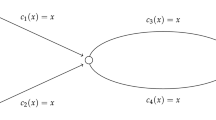Abstract
We consider a repeated congestion game with imperfect monitoring. At each stage, each player chooses to use some facilities and pays a cost that increases with the congestion. Two versions of the model are examined: a public monitoring setting where agents observe the cost of each available facility, and a private monitoring one where players observe only the cost of the facilities they use. A partial folk theorem holds: a Pareto-optimal outcome may result from selfish behavior and be sustained by a belief-free equilibrium of the repeated game. We prove this result assuming that players use strategies of bounded complexity and we estimate the strategic complexity needed to achieve efficiency. It is shown that, under some conditions on the number of players and the structure of the game, this complexity is very small even under private monitoring. The case of network routing games is examined in detail.
Similar content being viewed by others
References
Afergan M (2005) Applying the repeated game framework to multiparty networked applications. Ph.D. thesis, MIT, Cambridge, MA
Afergan M (2006) Using repeated games to design incentive-based routing systems. In: IEEE INFOCOM 2006. Barcelona
Afergan M, Sami R (2006) Repeated-game modeling of multicast overlays. In: IEEE INFOCOM 2006. Barcelona
Anshelevich E, Dasgupta A, Kleinberg J, Tardos É, Wexler T, Roughgarden T (2008) The price of stability for network design with fair cost allocation. SIAM J Comput 38: 1602–1623
Aumann RJ, Shapley LS (1976) Long-term competition—a game-theoretic analysis. Technical report, Hebrew University of Jerusalem. Reprinted in Essays in Game Theory. In: Megiddo N (ed) Honor of Michael Maschler (1994). Springer, New York, pp 1–15
Braess D (1968) Úber ein Paradoxon aus der Verkehrsplanung. Unternehmensforschung 12: 258–268
Braess D (2005) On a paradox of traffic planning. Transport Sci 39:446–450. Translation of the original German (1968) article by D. Braess, A. Nagurney and T. Wakolbinger
Correa JR, Schulz AS, Stier-Moses NE (2004) Selfish routing in capacitated networks. Math Oper Res 29: 961–976
Ely JC, Hörner J, Olszewski W (2005) Belief-free equilibria in repeated games. Econometrica 73: 377–415
Friedman JW (1971) A non-cooperative equilibrium for supergames. Rev Econ Stud 38: 1–12
Fudenberg D, Levine DK (1991) An approximate folk theorem with imperfect private information. J Econ Theory 54: 26–47
Fudenberg D, Levine D, Maskin E (1994) The folk theorem with imperfect public information. Econometrica 62: 997–1039
Holzman R, Law-Yone N (1997) Strong equilibrium in congestion games. Game Econ Behav 21: 85–101
Holzman R, Law-yone N (2003) Network structure and strong equilibrium in route selection games. Math Soc Sci 46: 193–205
Kalai E, Stanford W (1988) Finite rationality and interpersonal complexity in repeated games. Econometrica 56: 397–410
Kandori M (1992) Social norms and community enforcement. Rev Econ Stud 59: 63–80
La RJ, Anantharam V (2002) Optimal routing control: repeated game approach. IEEE Trans Automat Control 47: 437–450
Mailath GJ, Samuelson L (2006) Repeated games and reputations. Oxford University Press, Oxford
Monderer D, Shapley LS (1996) Potential Games. Game Econ Behav 14: 124–143
Papadimitriou C (2001) Algorithms, games, and the Internet. In: Proceedings of the 33rd annual ACM symposium on the theory of computing, Hersonissos, Crete. ACM, New York, NY, USA, pp 749–753
Rosenthal RW (1973) A class of games possessing pure-strategy Nash equilibria. Int J Game Theory 2: 65–67
Roughgarden T (2005) Selfish routing and the price of anarchy. MIT Press, Cambridge
Roughgarden T (2007) Routing games. In: Algorithmic game theory. Cambridge University Press, Cambridge, pp 461–486
Roughgarden T, Tardos É (2004) Bounding the inefficiency of equilibria in nonatomic congestion games. Game Econ Behav 47: 389–403
Roughgarden T, Tardos É (2007) Introduction to the inefficiency of equilibria. In: Algorithmic game theory. Cambridge University Press, Cambridge, pp 443–459
Rubinstein A (1977) Equilibrium in supergames. Master’s thesis, Hebrew University of Jerusalem. Reprinted in Essays in Game Theory, In honor of Michael Maschler (1994) Edited by Nimrod Megiddo, pp 17–27. Springer, New York
Stigler GJ (1964) A theory of oligopoly. J Polit Econ 72: 44–61
Author information
Authors and Affiliations
Corresponding author
Rights and permissions
About this article
Cite this article
Scarsini, M., Tomala, T. Repeated congestion games with bounded rationality. Int J Game Theory 41, 651–669 (2012). https://doi.org/10.1007/s00182-011-0309-3
Accepted:
Published:
Issue Date:
DOI: https://doi.org/10.1007/s00182-011-0309-3




